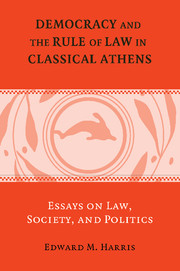Book contents
- Frontmatter
- Contents
- PREFACE
- ACKNOWLEDGMENTS
- ABBREVIATIONS
- INTRODUCTION
- I LAW AND CONSTITUTIONAL HISTORY
- 1 Solon and the Spirit of the Law in Archaic and Classical Greece
- 2 Pericles' Praise of Athenian Democracy
- 3 Antigone the Lawyer, or the Ambiguities of Nomos
- 4 How Often Did the Athenian Assembly Meet?
- 5 When Did the Athenian Assembly Meet? Some New Evidence
- 6 Demosthenes and the Theoric Fund
- II LAW AND ECONOMY
- III LAW AND THE FAMILY
- IV ASPECTS OF PROCEDURE
- V ENVOI
- BIBLIOGRAPHY
- INDEX LOCORUM
- SUBJECT INDEX
1 - Solon and the Spirit of the Law in Archaic and Classical Greece
Published online by Cambridge University Press: 25 February 2010
- Frontmatter
- Contents
- PREFACE
- ACKNOWLEDGMENTS
- ABBREVIATIONS
- INTRODUCTION
- I LAW AND CONSTITUTIONAL HISTORY
- 1 Solon and the Spirit of the Law in Archaic and Classical Greece
- 2 Pericles' Praise of Athenian Democracy
- 3 Antigone the Lawyer, or the Ambiguities of Nomos
- 4 How Often Did the Athenian Assembly Meet?
- 5 When Did the Athenian Assembly Meet? Some New Evidence
- 6 Demosthenes and the Theoric Fund
- II LAW AND ECONOMY
- III LAW AND THE FAMILY
- IV ASPECTS OF PROCEDURE
- V ENVOI
- BIBLIOGRAPHY
- INDEX LOCORUM
- SUBJECT INDEX
Summary
the scattered remains of the laws enacted by the greek poleis (city-states) during the Archaic and Classical periods hardly appear to form a unified body of law. Most of our evidence for Greek Law in this period comes from two poleis, Athens and Gortyn on the island of Crete. Several statutes from the collection of laws created by Solon in 594 have been preserved, but many of these are found in late sources such as Plutarch and lexica compiled by scholars during the Roman Empire or the Byzantine period, and it is often difficult to tell how much of the information they provide is reliable. There are two main problems encountered when studying the laws attributed to Solon. On the one hand, a law attributed to Solon may have been a genuine law dating from the Archaic or Classical period, but not a law that Solon himself enacted. One thinks for example of the laws about the appointment of nomothetai attributed to Solon by Demosthenes (20.93–4). These were actual laws that were in force at the time, but we know that these nomothetai were not created until after 403 BCE. On the other hand, a law attributed to Solon may have been a forgery completely invented by a later author. For instance, Aeschines (1.6–23) discusses several laws of Solon about schools for boys, the prosecution of hybris, and the penalties for male prostitutes. In the manuscripts of his speech we find inserted several documents purporting to be the texts of these laws of Solon, but it has long been recognized that these are all forgeries.
- Type
- Chapter
- Information
- Democracy and the Rule of Law in Classical AthensEssays on Law, Society, and Politics, pp. 3 - 28Publisher: Cambridge University PressPrint publication year: 2006
- 2
- Cited by



